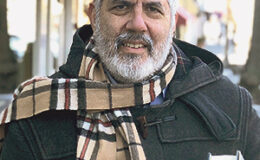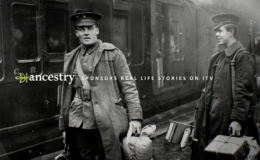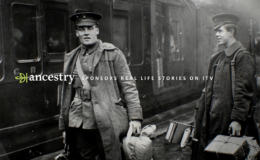Thirty years ago, while Erika Lee was an undergraduate student, she made her first visit to her paternal grandfather’s village in Guangdong Province in southeastern China. Her grandfather — who had not been back for six decades — and other relatives organized the trip and took her along to see where his home once stood.
“To be able to stand on this plot of land and think — how many generations forward — where everyone has gone and what they have been able to do, that is gratifying,” said Dr. Lee, now a professor of Asian American studies at the University of Minnesota and the director of its Immigration History Research Center. “It was a life-changing trip for me and set me on this path to becoming a historian.”
So this past summer, when she had a chance to do some research in China, she took her two teenage sons. She planned the trip with My China Roots, a bespoke ancestry research company based in Beijing that works with Chinese diaspora clients. It helped her with language issues (she does not speak Mandarin or Cantonese) and traced her family’s ancestry back to the end of the Song dynasty, in the late 1200s.
“As a mother myself, I wanted to bring my sons to the village and allow them to experience what that was like,” she said, adding that her sons now often discuss the family’s immigrant experiences. “A few years before, we had gone to Ireland, where my husband’s ancestors were from, and we stood on the site of his great-great-grandmother’s house. So we, as a family, are interested in doing that for all ancestral roots.”
For Dr. Lee, her sons and many others, a bespoke trip to an ancestral home is the kind of gift that will never be forgotten. And such journeys have become increasingly popular in recent years, thanks in large part to television programs like “Who Do You Think You Are?” from the BBC, whose American version returned to NBC this year; genealogy websites like Ancestry.com; and genetic testing services like 23andMe, which offers DNA kits that were big sellers last year on Black Friday in the United States.
As a result, more companies — including My China Roots; the British company Ancestral Footsteps; and Ancestral Attic, which is headquartered in Michigan and Poland — are focusing on bespoke ancestry travel. They can turn what might have been a general sightseeing trip to an ancestral homeland into one that includes a visit to the church where your great-grandfather worshiped or the factory where your grandmother was a seamstress. You might even be able to meet some previously unknown relatives.
“It makes sense people may look to use a specialist company, as the barriers to getting anything tangible out of a trip like this can be formidable,” Tony Hall, Lonely Planet’s vice president of experience, wrote in an email. “I have struggled through basic mistakes while exploring areas of London my ancestors come from; I can’t imagine the complexity of doing the same in India or China.”
TCS World Travel, the Seattle-based company that for decades has offered private jet expeditions around the globe, is one of the latest businesses to jump on the bandwagon.
For several years the company arranged customized ancestral trips, like a private visit to a castle in Germany once owned by a client’s relatives. But “a lot of our clients come to us over and over again, and we were getting requests,” said Elisabeth Nelson, the managing director for TCS’s luxury custom travel. “So we started looking at ways to expand this opportunity.”
This year the company officially partnered with Heritage Consulting, a genealogy company in Salt Lake City, to offer high-end personalized trips for customers wanting a deep dive into their family roots.
After clients pay an initial $5,000 fee to TCS to get the genealogy research started — with experts looking at everything from birth and marriage certificates to military and naturalization records — it generally takes six months to a year to organize excursions, which can include a professional photographer to document the experience.
The cost of such trips can vary widely, depending on the type of travel, accommodation and services required, but TCS estimated that the average range for its kind of high-end travel was $1,500 to $2,000 per person per day.
“The holidays always bring more interest in people wanting to provide their spouse or their uncle or their mother a gift that no one else can give them,” said Stan Lindaas, the owner of Heritage Consulting. “None of your neighbors will ever have this same gift, everyone is unique. It is custom made for the individual, and there is a great power in that.”
Some companies, like TCS and Ancestral Footsteps, will organize trips anywhere in the world. Sue Hills, the founder of Ancestral Footsteps, said that most of her company’s trips are given as gifts. Separate from the cost of any travel, for 5,000 pounds ($6,445) it can produce a coffee-table book highlighting stories, documents and photographs of specific ancestors along with the social and historical context, said Ms. Hills, who is also a producer of the BBC’s “Who Do You Think You Are?”
Other businesses, however, focus on particular regions. My China Roots needs just the ancestor’s name in Chinese characters and where the family originated. “With these two specific bits of information, we can start a search,” said Chrislyn Choo, the company’s multimedia content officer.
It also is gathering Chinese records and clan books (called zupu), which contain extensive family trees, maps, photographs and biographies that can date back thousands of years, to build an accessible database online.
Ancestral Attic, which creates 30 to 40 trips a year across central and Eastern Europe, said it could be difficult to find documents in state and church archives to trace family lines because of the many border changes in Europe over the centuries.
William Henrichs Cannon of Chicago, a retired computer executive, has arranged several trips with Ancestral Attic and said its extensive knowledge of the region was integral to their success.
“We would go to villages in what is now northwestern Poland, and old ladies who knew where the remains of the German cemeteries were would volunteer to take us there,” he said, adding that the women would sometimes even get down on their hands and knees to clean moss off the headstones.
“In the ancestral village of my great-great-grandmother,” he said, “we were led to a half circle of soldiers killed in World War I, and we found several graves” of ancestors.
Overall, Mr. Cannon said, the service had played a “marvelous role” in helping him discover so much of his family’s history.















